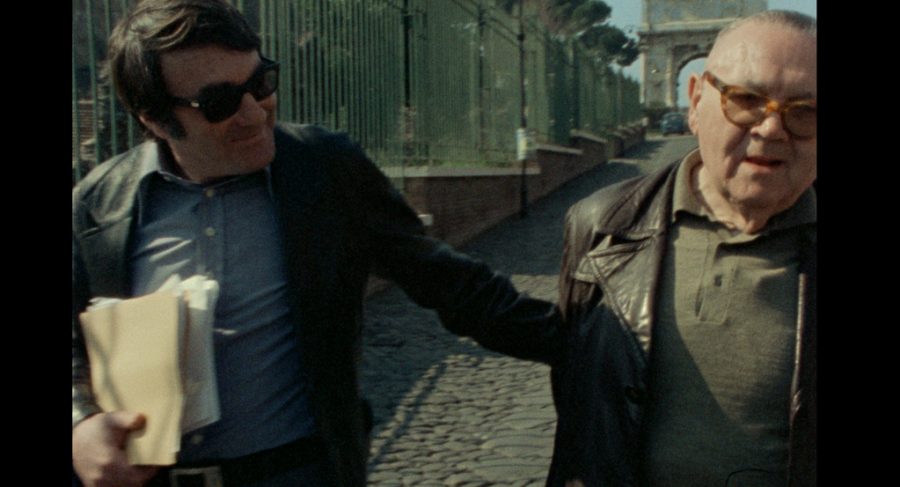
 At the impressive age of 88, filmmaker Claude Lanzmann has the ability to muster more forceful passion than people six decades younger. In 1985 he released “Shoah”, a mammoth account of the Holocaust that took him eleven years to complete, the film which has often been called the definitive documentary on the mass murders of Jews under the Nazi regime, also presented viewers with an innovative narrative style; instead of using historical footage, Lanzmann turned the film into a confessional of sorts in which various interviewees gave first person accounts of the things they’d experienced. More investigative journalism than historical collaging, the nine hour long film changed the way in which nonfiction films were perceived.
At the impressive age of 88, filmmaker Claude Lanzmann has the ability to muster more forceful passion than people six decades younger. In 1985 he released “Shoah”, a mammoth account of the Holocaust that took him eleven years to complete, the film which has often been called the definitive documentary on the mass murders of Jews under the Nazi regime, also presented viewers with an innovative narrative style; instead of using historical footage, Lanzmann turned the film into a confessional of sorts in which various interviewees gave first person accounts of the things they’d experienced. More investigative journalism than historical collaging, the nine hour long film changed the way in which nonfiction films were perceived.
Despite its epic running time, “Shoah” left some things out, including the role of the Jewish Elders - Jews who were appointed by the Nazis as administrators - and “The Last of the Unjust” is entirely dedicated to the only one of them who survived the war: Benjamin Murmelstein. The two met in 1975 in Rome where Murmelstein lived and most of the film is comprised of his testimony about his role as the last president of the Jewish Council in Theresienstadt ghetto in the city of Terezín. Theresienstadt was a “model camp” used by the Nazis as propaganda to fool the rest of the world and distract them from what was going on in places like Auschwitz.
Theresienstadt then served as a stage of sorts, in which the Nazis could invite international peacekeepers and show them they were being fair to the Jews and Murmelstein was the showrunner. “Like Scheherazade I told stories” he says, as he explains his role in trying to maintain order in what otherwise would’ve been complete chaos (there is a play by Juan Mayorga called “Himmelweg” that seems to have been inspired by the Terezín camp). Murmelstein has been accused of betraying his people and collaborating in the systematic extermination of Jews, which makes the film a truly riveting experience. Should we believe that he was ignorant of what the Nazis were doing in “the East”? Was he doing this out of mere self-preservation (“saving myself and saving the ghetto were one and the same thing” he reveals at one point) or was he a megalomaniac enjoying the limited power he’d been granted during the war?
The film begins with a justification in which Lanzmann acknowledges that he simply had no right to keep to himself everything that Murmelstein revealed and using a technique similar to “Shoah”, he takes us to the places where these events occurred and serves as narrator. It’s touching and impressive to hear his voice rise as he calls Nazi officers “swine” and instructs his cameramen to take in as much as they can of the sad beauty of these places. Without recurring to reenactments or historical footage, he simply allows Murmelstein’s voice to accompany us down places where Jews were once prisoners, in a town that was regarded as a gift to the Jews from the Fuhrer.
The cruelty of the Nazis is never as evident as when Murmelstein defies Hanna Arendt’s theory that there was some “banality” to their acts. “[Eichmann] banal? Laughable” exclaims an excited Murmelstein as he wonders why his own people suggested he was equally guilty. Lanzmann cleverly reveals the Elder’s complex contradictions as he claims to have been like “Sancho Panza, a calculating realist with two feet on the ground” and showing unmistakable pride when telling a story about how he was the only Jew asked to seat next to Eichmann. Throughout his interviews, we see Murmelstein was a force to be reckoned with and we can’t help but admire the same qualities Lanzmann saw in him. He calls himself “a man with a mission”, “a pragmatist” and never seems to show remorse for anything he did, after all he survived didn’t he?
Where Murmelstein showed his clear humanity was in his insistence that historical records be kept and perhaps with the safety net of not having other witnesses around, he tells a tale which shockingly reveals that we might never reach a point where we’ve heard about all the horrors created by the Nazis. “Sometimes looking back is not a good thing” says Murmelstein during one of his most introspective moments, as he’s just compared himself to Orpheus before conceding that “a Jewish elder after the war is like a dinosaur in a freeway”. Murmelstein might’ve not been telling all the truth but his weary face reveals a soul that, regardless of how good or bad it was, had experienced more than anyone should ever live through.